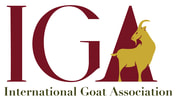More About IGA Country Representatives
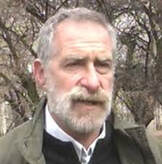
Patricio Dayenoff (Argentina)
Patricio has worked in research, development, training of producers, and training students in goat production for 40 years in ecologically sustainable, economically profitable, and socially acceptable models using a participatory research and experimentation approach encompassing competitive design, sustainability, and equity.
He graduated as a Veterinarian in Argentina, trained in the production of small ruminants in arid zones at the Ben-Gurion University of the Negev, Israel, where he was responsible for a sheep and goat production development project involving Bedouin tribes. He completed his graduate studies as a Specialist in Animal Production. Patricio obtained a Master’s of Science degree in Animal Production and a Doctorate in Veterinary Medicine degree in Spain.
He was part of the formulation team of the National Law for Goat Development of Argentina and responsible for the drafting of the Meat Sector of the National Goat Program. Patricio is a Principal Investigator of the National Institute of Agricultural Technology and a Professor of the Goat Production and Chair of both the National University of La Pampa and the Juan Agustín Maza University.
Finally, Patricio is a husband, father, and grandfather.
Patricio has worked in research, development, training of producers, and training students in goat production for 40 years in ecologically sustainable, economically profitable, and socially acceptable models using a participatory research and experimentation approach encompassing competitive design, sustainability, and equity.
He graduated as a Veterinarian in Argentina, trained in the production of small ruminants in arid zones at the Ben-Gurion University of the Negev, Israel, where he was responsible for a sheep and goat production development project involving Bedouin tribes. He completed his graduate studies as a Specialist in Animal Production. Patricio obtained a Master’s of Science degree in Animal Production and a Doctorate in Veterinary Medicine degree in Spain.
He was part of the formulation team of the National Law for Goat Development of Argentina and responsible for the drafting of the Meat Sector of the National Goat Program. Patricio is a Principal Investigator of the National Institute of Agricultural Technology and a Professor of the Goat Production and Chair of both the National University of La Pampa and the Juan Agustín Maza University.
Finally, Patricio is a husband, father, and grandfather.
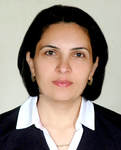
Dr. Narine Babayan (Armenia)
Narine graduated with a Diploma of Doctor of Veterinary Medicine from the Veterinary Medicine department of the Armenian National Agrarian University and was awarded a Ph.D. in Animal Breeding from the Animal Breeding department of the same institution. She also spent six months at the Wageningen International Center for Development-Oriented Research in Agriculture and participated at short-term trainings in France, the Netherlands and the E (Kika) de la Garza Institute for Goat Research at Langston University, Oklahoma.
Narine has been the Manager and Coordinator of the Armenian Improved Dairy (ARID) Goat Center since 2000. She is also a Senior Consultant at the Armenia Agriculture Foundation and holds a ¼ time position as a Senior Scientist at the Armenian Agrarian University.
The activities of the ARID Center and other activities related to goat industry development in Armenia were described previously in the IGA blog and in the September 2014 IGA newsletter under ‘Armenia Goat Industry Development Project.’
Narine graduated with a Diploma of Doctor of Veterinary Medicine from the Veterinary Medicine department of the Armenian National Agrarian University and was awarded a Ph.D. in Animal Breeding from the Animal Breeding department of the same institution. She also spent six months at the Wageningen International Center for Development-Oriented Research in Agriculture and participated at short-term trainings in France, the Netherlands and the E (Kika) de la Garza Institute for Goat Research at Langston University, Oklahoma.
Narine has been the Manager and Coordinator of the Armenian Improved Dairy (ARID) Goat Center since 2000. She is also a Senior Consultant at the Armenia Agriculture Foundation and holds a ¼ time position as a Senior Scientist at the Armenian Agrarian University.
The activities of the ARID Center and other activities related to goat industry development in Armenia were described previously in the IGA blog and in the September 2014 IGA newsletter under ‘Armenia Goat Industry Development Project.’
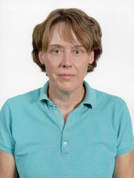
Dr. Angelika Stemmer (Bolivia)
Angelika is a lecturer at the agricultural faculty of San Simon University in Cochabamba. Angelika is German but has been living in her adoptive country Bolivia for more than 20 years. Research is part of her responsibilities. Angelika manages a small flock of goats and sheep at her faculty, and she oversees the Small Ruminant Program. When we can get some funding, we organize practical courses for smallholders.
Angelika is a lecturer at the agricultural faculty of San Simon University in Cochabamba. Angelika is German but has been living in her adoptive country Bolivia for more than 20 years. Research is part of her responsibilities. Angelika manages a small flock of goats and sheep at her faculty, and she oversees the Small Ruminant Program. When we can get some funding, we organize practical courses for smallholders.
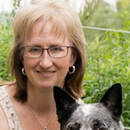
Cath Bauman (Canada, Eastern)
Cath is a lecturer in the department of Population Medicine at the University of Guelph/Ontario Veterinary College. She was a veterinary practitioner for over 15 years before pursuing graduate studies in Epidemiology. Her primary research focus is dairy small ruminants with emphasis on chronic production limiting diseases, neonatal survival and milk quality. Her other research interests include clinical trial design and analysis and diagnostic test evaluations. She spends her spare time with her own Alpine herd, making and eating cheese.
Cath is a lecturer in the department of Population Medicine at the University of Guelph/Ontario Veterinary College. She was a veterinary practitioner for over 15 years before pursuing graduate studies in Epidemiology. Her primary research focus is dairy small ruminants with emphasis on chronic production limiting diseases, neonatal survival and milk quality. Her other research interests include clinical trial design and analysis and diagnostic test evaluations. She spends her spare time with her own Alpine herd, making and eating cheese.
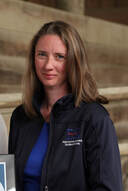
Zoë Thorbergson (Canada, Western)
Zoë holds a master’s degree in Animal Science from Charles Sturt University along with a Diploma in Agriculture from the University of Guelph. Zoë has been involved with the goat industry for over 30 years, from founding local goat associations to working on provincial issues such as Mycoplasma ovipneumoniae transmission between domestic and wild sheep and goats in BC to advocating for policy change in the Canadian import regulations involving S146 and K222 scrapie genotyping. In the last three decades, she has also facilitated goat management educational seminars and materials.
She has owned several goat breeds since childhood and currently enjoys working with a herd of purebred Nubians. Currently, Zoë is the president of the British Columbia Goat Association as well as a Canadian Goat Society Licensed Dairy Goat judge.
Zoë holds a master’s degree in Animal Science from Charles Sturt University along with a Diploma in Agriculture from the University of Guelph. Zoë has been involved with the goat industry for over 30 years, from founding local goat associations to working on provincial issues such as Mycoplasma ovipneumoniae transmission between domestic and wild sheep and goats in BC to advocating for policy change in the Canadian import regulations involving S146 and K222 scrapie genotyping. In the last three decades, she has also facilitated goat management educational seminars and materials.
She has owned several goat breeds since childhood and currently enjoys working with a herd of purebred Nubians. Currently, Zoë is the president of the British Columbia Goat Association as well as a Canadian Goat Society Licensed Dairy Goat judge.
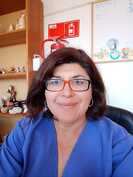
Claudia Torres Pizarro (Chile)
Claudia works at the Las Cardas Agricultural Experiment Station, University of Chile. This Station, located in Coquimbo, was created in 1979. She is an Administrator of the Experimental Station (since 2000), but that does not impede her from applying and participating in research and other projects.
The Las Cardas Agricultural Experiment Station comprises 5,400 hectares dedicated to three areas: fruit trees resistant to water deficit, natural resources, and goat production. The latter is her sole responsibility in terms of production management, cheese making, and product sales. Claudia participates in the other areas in a supportive capacity.
As general background, it is essential to note that the Coquimbo Region, located 500 km north of Santiago, is an arid area highly affected by desertification, hence the Station’s focus areas. Seventy percent of the national goat population is concentrated in this region (approximately 350,000 heads), divided among 5,391 producers, of which 80% are small producers affected by social vulnerability problems.
The Regional Government has identified the following gaps:
The projects executed at the Las Cardas Experimental Station seek to bridge these gaps through research and training directly related to the issues mentioned above. As a result, from the point of view of interaction with the region, the Station is a demonstration center where results of the research carried out are shared, and technologies and practices are transferred to farmers, agriculture professionals, and students through field days, courses, presentations, and on-farm consultancies. Apart from the specific extension activities of the projects in execution, Las Cardas Experimental Station has a strong working relationship with the Institute for Agricultural Development (INDAP) of the Ministry of Agriculture to improve regional goat production.
Finally, in terms of infrastructure, the Station has an analytic microbiology laboratory and a laboratory for proximal analyses of milk and cheese, also under Claudia’s responsibility.
Claudia works at the Las Cardas Agricultural Experiment Station, University of Chile. This Station, located in Coquimbo, was created in 1979. She is an Administrator of the Experimental Station (since 2000), but that does not impede her from applying and participating in research and other projects.
The Las Cardas Agricultural Experiment Station comprises 5,400 hectares dedicated to three areas: fruit trees resistant to water deficit, natural resources, and goat production. The latter is her sole responsibility in terms of production management, cheese making, and product sales. Claudia participates in the other areas in a supportive capacity.
As general background, it is essential to note that the Coquimbo Region, located 500 km north of Santiago, is an arid area highly affected by desertification, hence the Station’s focus areas. Seventy percent of the national goat population is concentrated in this region (approximately 350,000 heads), divided among 5,391 producers, of which 80% are small producers affected by social vulnerability problems.
The Regional Government has identified the following gaps:
- Failures in the cheese elaboration practices and difficulties in achieving satisfactory sanitary measures in artisanal cheese factories,
- Due to the lack of adequate sanitation, the products are devalued, and the primary producers are not obtaining a justifiable return for their products,
- It is not only a production issue but also a social, cultural, and political problem.
The projects executed at the Las Cardas Experimental Station seek to bridge these gaps through research and training directly related to the issues mentioned above. As a result, from the point of view of interaction with the region, the Station is a demonstration center where results of the research carried out are shared, and technologies and practices are transferred to farmers, agriculture professionals, and students through field days, courses, presentations, and on-farm consultancies. Apart from the specific extension activities of the projects in execution, Las Cardas Experimental Station has a strong working relationship with the Institute for Agricultural Development (INDAP) of the Ministry of Agriculture to improve regional goat production.
Finally, in terms of infrastructure, the Station has an analytic microbiology laboratory and a laboratory for proximal analyses of milk and cheese, also under Claudia’s responsibility.
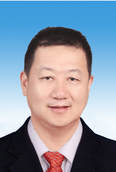
Sun Haizhou (China, Northwest & Inner Mongolia)
Sun Haizhou is a researcher and the Director of the Institute of Animal Nutrition and Feed Research of the Inner Mongolia Academy of Agriculture and Animal Husbandry Sciences in Hohhot. He holds a Ph.D. in Animal Nutrition from the Inner Mongolia Agriculture University.
Sun Haizhou is a researcher and the Director of the Institute of Animal Nutrition and Feed Research of the Inner Mongolia Academy of Agriculture and Animal Husbandry Sciences in Hohhot. He holds a Ph.D. in Animal Nutrition from the Inner Mongolia Agriculture University.
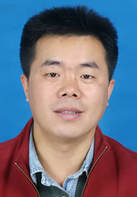
Yongju Zhao (China, Southwest)
Yongju Zhao graduated with a Bachelors degree in Animal Science from Qingdao Agricultural University and received a Masters of Science in Animal Genetics, Breeding and Reproduction from Gansu Agricultural University. He obtained an MD from the Third Military Medical School University, focusing in Models of Transgenic Animals.
After his medical degree, he attended Northeast Wales Institute (NEWI), United Kingdom, as a Visiting Scholar in Forensic Science and Technology. Then, he attended Aarhus University, Denmark, as a Visiting Scholar in Molecular Genetics, as well as Purdue University, USA, as a Visiting Scholar in Animal Behavior and Well-Being.
Yongju Zhao is presently a Professor at Southwest University, China. Additionally, he is Vice Chairman of Chongqing Animal Husbandry and Veterinary Society, and the Standing Director of the following associations: Chinese Society of Sheep and Goat Production, Chongqing Society of Technical Task Force, and Association of Chinese Sheep and Goat Husbandry. He is also a member of the European Society of Domestic Animal Reproduction (ESDAR), the Chinese Association of Laboratory Animal Science and the Chinese Genetics Society. As part of his university responsibilities, he teaches both graduate and undergraduate courses. Yongju Zhao has published ten books and refereed numerous journal articles.
Yongju Zhao graduated with a Bachelors degree in Animal Science from Qingdao Agricultural University and received a Masters of Science in Animal Genetics, Breeding and Reproduction from Gansu Agricultural University. He obtained an MD from the Third Military Medical School University, focusing in Models of Transgenic Animals.
After his medical degree, he attended Northeast Wales Institute (NEWI), United Kingdom, as a Visiting Scholar in Forensic Science and Technology. Then, he attended Aarhus University, Denmark, as a Visiting Scholar in Molecular Genetics, as well as Purdue University, USA, as a Visiting Scholar in Animal Behavior and Well-Being.
Yongju Zhao is presently a Professor at Southwest University, China. Additionally, he is Vice Chairman of Chongqing Animal Husbandry and Veterinary Society, and the Standing Director of the following associations: Chinese Society of Sheep and Goat Production, Chongqing Society of Technical Task Force, and Association of Chinese Sheep and Goat Husbandry. He is also a member of the European Society of Domestic Animal Reproduction (ESDAR), the Chinese Association of Laboratory Animal Science and the Chinese Genetics Society. As part of his university responsibilities, he teaches both graduate and undergraduate courses. Yongju Zhao has published ten books and refereed numerous journal articles.
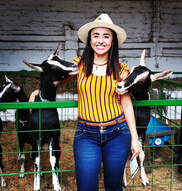
Mónica Andrea Cardozo Herrán (Colombia)
Monica graduated in Animal Science and Veterinary Medicine from the University of Tolima in Tolima – Colombia, in 2014. In 2016, she obtained a Master's Degree in Animal Production from the Autonomous University of Yucatan in Yucatan – Mexico, and in 2019 she received a degree as a Specialist in Pedagogy for University teaching granted by the University La Gran Colombia in Bogotá – Colombia. She has been studying goat production since 2014, with an emphasis on food and nutrition systems.
She has worked as a University Teacher on ruminant nutrition. Presently, she is an expert consultant for the animal production company Grokaizen, conducting virtual conferences, courses, and goat production support. In July 2019, she started a project with goats called Hircus, Passionate about Goats. She wants to promote goat production and consumption of goat products using social media networks such as Instagram, Facebook, and YouTube, to support and connect producers and consumers in Colombia and different Spanish speaking countries.
Monica graduated in Animal Science and Veterinary Medicine from the University of Tolima in Tolima – Colombia, in 2014. In 2016, she obtained a Master's Degree in Animal Production from the Autonomous University of Yucatan in Yucatan – Mexico, and in 2019 she received a degree as a Specialist in Pedagogy for University teaching granted by the University La Gran Colombia in Bogotá – Colombia. She has been studying goat production since 2014, with an emphasis on food and nutrition systems.
She has worked as a University Teacher on ruminant nutrition. Presently, she is an expert consultant for the animal production company Grokaizen, conducting virtual conferences, courses, and goat production support. In July 2019, she started a project with goats called Hircus, Passionate about Goats. She wants to promote goat production and consumption of goat products using social media networks such as Instagram, Facebook, and YouTube, to support and connect producers and consumers in Colombia and different Spanish speaking countries.
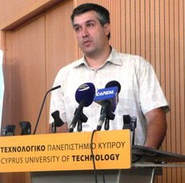
Dr. Ouranios Tzamaloukas (Cyprus)
Ouranios holds a Bachelor’s degree (BSc) in Animal Science from the Agricultural University of Athens, and Master of Science (MSc) and Doctoral degrees (Ph.D.) from the University of Edinburgh in the United Kingdom.
Before joining the Cyprus University of Technology in 2008, he researched animal nutrition regarding gastrointestinal nematodes, immunology, alternative forage use, organic farming and feed analysis at the institutes of Scottish Agricultural College, Moredun Research Institute, and University of Edinburgh. He has worked in Greece as visiting lecturer at Technological Institutes as a Farm Advisor.
During his academic appointment at the Cyprus Institute of Technology, he attracted funding from the Research Promotion Foundation of Cyprus, the EU and the dairy/feed industry of Cyprus. His main research interests include the interplay of nutritional-genetic parameters affecting milk traits, organic farming, alternative feeds and the lipid profile of milk and dairy products.
Ouranios holds a Bachelor’s degree (BSc) in Animal Science from the Agricultural University of Athens, and Master of Science (MSc) and Doctoral degrees (Ph.D.) from the University of Edinburgh in the United Kingdom.
Before joining the Cyprus University of Technology in 2008, he researched animal nutrition regarding gastrointestinal nematodes, immunology, alternative forage use, organic farming and feed analysis at the institutes of Scottish Agricultural College, Moredun Research Institute, and University of Edinburgh. He has worked in Greece as visiting lecturer at Technological Institutes as a Farm Advisor.
During his academic appointment at the Cyprus Institute of Technology, he attracted funding from the Research Promotion Foundation of Cyprus, the EU and the dairy/feed industry of Cyprus. His main research interests include the interplay of nutritional-genetic parameters affecting milk traits, organic farming, alternative feeds and the lipid profile of milk and dairy products.
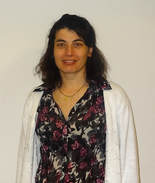
Dr. Zuzana Sztankoova (Czech Republic)
In 2017, Zuzana was responsible for a research project implemented in cooperation with the Czech breeders' association and several commercial farms ‘Influence of genetic polymorphism of lipogenic enzymes on milk fat composition and fatty acid content in goat milk’. Zuzana is also a member of the research team of another project ‘Research on factors affecting the profitability, quality, and safety of goat milk.’ The results are presented yearly at the annual conference of the Czech breeders' association; in 2017 it took place on 3-4 November.
Zuzana attended the international congress NUTRICON 2017, held on 5-7 October 2017 in Macedonia, as a co-author of the contribution Polymorphism at BTN1A1, SCD AND LPL and its association with milk parameters in the Czech white shorthaired goat breed.
Zuzana and co-author Jana Rychtarova wrote the chapter, Current status of goat farming in the Czech Republic in Sustainable Goat Production in Adverse Environments: Volume II (Simões, João, and Gutiérrez, Carlos (Ed.). ISBN: 978-3-319-71293-2
In 2017, Zuzana was responsible for a research project implemented in cooperation with the Czech breeders' association and several commercial farms ‘Influence of genetic polymorphism of lipogenic enzymes on milk fat composition and fatty acid content in goat milk’. Zuzana is also a member of the research team of another project ‘Research on factors affecting the profitability, quality, and safety of goat milk.’ The results are presented yearly at the annual conference of the Czech breeders' association; in 2017 it took place on 3-4 November.
Zuzana attended the international congress NUTRICON 2017, held on 5-7 October 2017 in Macedonia, as a co-author of the contribution Polymorphism at BTN1A1, SCD AND LPL and its association with milk parameters in the Czech white shorthaired goat breed.
Zuzana and co-author Jana Rychtarova wrote the chapter, Current status of goat farming in the Czech Republic in Sustainable Goat Production in Adverse Environments: Volume II (Simões, João, and Gutiérrez, Carlos (Ed.). ISBN: 978-3-319-71293-2
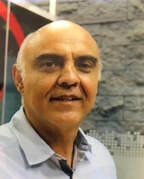
Rodrigo Arias Azurdia (Guatemala)
Mr. Arias has more than 30 years of experience working in multi-sectoral development programs with an emphasis on Agriculture and Food Security themes, including Agriculture Research. His experience includes projects funded by international donors, both in NGOs and governmental organizations, including more than fifteen years of working and managing USAID resources. His extensive professional experience includes developing specific strategies focused on gender equality. Mr. Arias graduated as an Agriculture Engineer, holds a Master’s degree in Agriculture Sciences and has extensive and proven expertise in managing Agriculture, Livestock and Food Security programs, including Research, Development and Community Extension outreach in Guatemala, as well as direct oversight for community mobilization, program design and implementation from start-up, partner relationships, and the monitoring and evaluation of projects with a holistic and integrated approach.
Mr. Arias has more than 30 years of experience working in multi-sectoral development programs with an emphasis on Agriculture and Food Security themes, including Agriculture Research. His experience includes projects funded by international donors, both in NGOs and governmental organizations, including more than fifteen years of working and managing USAID resources. His extensive professional experience includes developing specific strategies focused on gender equality. Mr. Arias graduated as an Agriculture Engineer, holds a Master’s degree in Agriculture Sciences and has extensive and proven expertise in managing Agriculture, Livestock and Food Security programs, including Research, Development and Community Extension outreach in Guatemala, as well as direct oversight for community mobilization, program design and implementation from start-up, partner relationships, and the monitoring and evaluation of projects with a holistic and integrated approach.
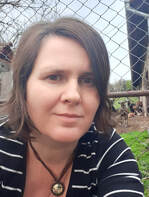
Tímea Milisits-Németh (Hungary)
Timea graduated from the Faculty of Animal Science in Kaposvár University, Hungary, in 2003. She wrote her university memoirs on the topic of factors affecting technology development in the goat sector. During her university studies, she spent 3x2 months on large milking goat farms in Belgium and France.
Tímea obtained her Ph.D. in 2010 at the same University in Hungary. Her thesis's topic was the morphology and production of Hungarian local goat breeds and the effect of international breeds (Saanen and Alpine) on them.
Since 2004, Timea was a researcher at the Research Institute for Animal Breeding, Nutrition and Meat Science in Herceghalom, Hungary. She has experience in writing proposals, doing research experiments, and organizing fairs and conferences.
She is the national representative of goat producers in the Hungarian Association for Sheep and Goat Breeders and the Interprofessional Organization of Sheep and Goats in Hungary.
With her husband, they have a little goat flock at home just for self-supporting purposes.
Timea graduated from the Faculty of Animal Science in Kaposvár University, Hungary, in 2003. She wrote her university memoirs on the topic of factors affecting technology development in the goat sector. During her university studies, she spent 3x2 months on large milking goat farms in Belgium and France.
Tímea obtained her Ph.D. in 2010 at the same University in Hungary. Her thesis's topic was the morphology and production of Hungarian local goat breeds and the effect of international breeds (Saanen and Alpine) on them.
Since 2004, Timea was a researcher at the Research Institute for Animal Breeding, Nutrition and Meat Science in Herceghalom, Hungary. She has experience in writing proposals, doing research experiments, and organizing fairs and conferences.
She is the national representative of goat producers in the Hungarian Association for Sheep and Goat Breeders and the Interprofessional Organization of Sheep and Goats in Hungary.
With her husband, they have a little goat flock at home just for self-supporting purposes.
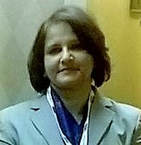
Dr. Mamta Dhawan (India)
Mamta is a veterinarian with over 20 years of varied experience ranging from international organizations like GALVmed, South Asia Pro-Poor Livestock Policy Programme (FAO and National Dairy Development Board of India joint programme), Animal Husbandry Department of Rajasthan, and various animal welfare organizations.
She has been pro-actively championing the need for mainstreaming Community Animal Health Workers as a means of reaching veterinary services for control of PPR and Goat Pox to smallholder goat farmers to increase their incomes and nutritional security. She has worked extensively in policy influencing and advocacy of policies that favor smallholder farmers’ access to veterinary products, services, and extension. In her last appointment as Regional Manager for South Asia, Global Alliance for Livestock Veterinary Medicines, she trained in gender mainstreaming of programs and projects and focussed on reaching out to women farmers that keep goats and poultry through field projects.
Mamta is a veterinarian with over 20 years of varied experience ranging from international organizations like GALVmed, South Asia Pro-Poor Livestock Policy Programme (FAO and National Dairy Development Board of India joint programme), Animal Husbandry Department of Rajasthan, and various animal welfare organizations.
She has been pro-actively championing the need for mainstreaming Community Animal Health Workers as a means of reaching veterinary services for control of PPR and Goat Pox to smallholder goat farmers to increase their incomes and nutritional security. She has worked extensively in policy influencing and advocacy of policies that favor smallholder farmers’ access to veterinary products, services, and extension. In her last appointment as Regional Manager for South Asia, Global Alliance for Livestock Veterinary Medicines, she trained in gender mainstreaming of programs and projects and focussed on reaching out to women farmers that keep goats and poultry through field projects.
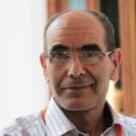
Dr. Farhad Mirzaei (Iran)
Farhad graduated with a B.Sc. in Animal Science and M.Sc. in Animal Husbandry Economics from Iran and was awarded a Ph.D. in Livestock Production Management from the National Dairy Research Institute, Karnal, India. His Ph.D. research focused on goat and kid rearing and breeding.
Farhad was the organizer and designer of World Goat Day to promote the socio-economic status of small ruminant producers through holding of National Goat Day in 2016 and World Goat Day in 2017. He is also a Senior Expert at the Animal Science Research Institute of Iran.
Farhad has established the Aryan Rural & Nomads Animal Production Management Association to support Rural and Nomadic communities to reach their rights as main suppliers of meat and protein to their nation and as Managing Director of the Association. His next objective is getting official recognition of World Goat Day on FAO’s international calendar.
Farhad graduated with a B.Sc. in Animal Science and M.Sc. in Animal Husbandry Economics from Iran and was awarded a Ph.D. in Livestock Production Management from the National Dairy Research Institute, Karnal, India. His Ph.D. research focused on goat and kid rearing and breeding.
Farhad was the organizer and designer of World Goat Day to promote the socio-economic status of small ruminant producers through holding of National Goat Day in 2016 and World Goat Day in 2017. He is also a Senior Expert at the Animal Science Research Institute of Iran.
Farhad has established the Aryan Rural & Nomads Animal Production Management Association to support Rural and Nomadic communities to reach their rights as main suppliers of meat and protein to their nation and as Managing Director of the Association. His next objective is getting official recognition of World Goat Day on FAO’s international calendar.

Dr. Luca Rapetti (Italy)
Luca is an associate professor in Animal Nutrition and Feeding at the Department of Agricultural and Environmental Sciences - Production, Landscape, Agroenergy, of the University of Milan. He carried out several researches, mainly at the experimental farm of the Department, aimed at evaluating the requirements of dairy goats and the nutritive value of feeds and diets, with a view to sustainability and quality of production.
Luca is a member of the Cheese Tester National Organization. He is mainly involved in goat cheese evaluation. In few words, from forage to cheese!
Luca is an associate professor in Animal Nutrition and Feeding at the Department of Agricultural and Environmental Sciences - Production, Landscape, Agroenergy, of the University of Milan. He carried out several researches, mainly at the experimental farm of the Department, aimed at evaluating the requirements of dairy goats and the nutritive value of feeds and diets, with a view to sustainability and quality of production.
Luca is a member of the Cheese Tester National Organization. He is mainly involved in goat cheese evaluation. In few words, from forage to cheese!
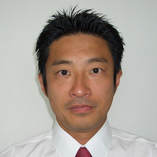
Dr. Yoshiaki Hayashi (Japan)
Yoshi is an Associate Professor in the Faculty of Agriculture at Meijo University. He is the Country Coordinator for the Asian Australasian Dairy Goat Network and the current Secretariat for the Japan Goat Network. Yoshi is also a member of the International Advisory Committee for the Conference on Sustainable Animal Agriculture for Developing Countries.
Yoshi received his Ph.D. in Animal Nutrition from the Graduate School for International Development and Cooperation, Hiroshima University. His doctoral thesis was, “Studies on feeding management on milk production of dairy buffalo and cattle in Tarai, Nepal.”
Yoshi has more than 20 publication credits, including a recent, article in the Net Journal of Agricultural Science, “Comparative evaluation of odorous compound absorption between goat milk and cow milk.”
Yoshi is an Associate Professor in the Faculty of Agriculture at Meijo University. He is the Country Coordinator for the Asian Australasian Dairy Goat Network and the current Secretariat for the Japan Goat Network. Yoshi is also a member of the International Advisory Committee for the Conference on Sustainable Animal Agriculture for Developing Countries.
Yoshi received his Ph.D. in Animal Nutrition from the Graduate School for International Development and Cooperation, Hiroshima University. His doctoral thesis was, “Studies on feeding management on milk production of dairy buffalo and cattle in Tarai, Nepal.”
Yoshi has more than 20 publication credits, including a recent, article in the Net Journal of Agricultural Science, “Comparative evaluation of odorous compound absorption between goat milk and cow milk.”
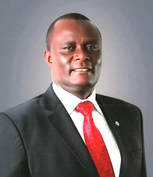
Dr. Alexander Kahi (Kenya)
Alexander is a Professor of Animal Breeding and Genomics at Egerton University, Department of Animal Sciences, and a member of the Permanent International Committee of the World Congress on Genetics Applied to Livestock Production. He holds a BSc in Animal Production and MSc in Animal Breeding and Genetics from Egerton University, Kenya and Doctor of Agricultural Sciences degree from the University of Hohenheim, Germany.
He is currently the Deputy Vice Chancellor (Academic Affairs) and International Program Director managing several projects funded by various donors. He is currently conducting a goat project with E (Kika) de la Garza Institute for Goat Research at Langton University, Oklahoma.
He has diverse experience with livestock production systems and their economics and a special interest in the definition of breeding objectives for different production systems, genetic improvement, computer simulation, genetic evaluation, experimental and observational quantitative genetics, molecular genetics, genomics, health and disease resistance, value chains analysis, development and capacity building in post-secondary education institutions and business incubation. He has served as visiting Professor in Australia (Animal Genetics and Breeding Unit, University of New England), Japan (Kyoto University) and the Netherlands (Wageningen University) and has published widely.
Alexander is a Professor of Animal Breeding and Genomics at Egerton University, Department of Animal Sciences, and a member of the Permanent International Committee of the World Congress on Genetics Applied to Livestock Production. He holds a BSc in Animal Production and MSc in Animal Breeding and Genetics from Egerton University, Kenya and Doctor of Agricultural Sciences degree from the University of Hohenheim, Germany.
He is currently the Deputy Vice Chancellor (Academic Affairs) and International Program Director managing several projects funded by various donors. He is currently conducting a goat project with E (Kika) de la Garza Institute for Goat Research at Langton University, Oklahoma.
He has diverse experience with livestock production systems and their economics and a special interest in the definition of breeding objectives for different production systems, genetic improvement, computer simulation, genetic evaluation, experimental and observational quantitative genetics, molecular genetics, genomics, health and disease resistance, value chains analysis, development and capacity building in post-secondary education institutions and business incubation. He has served as visiting Professor in Australia (Animal Genetics and Breeding Unit, University of New England), Japan (Kyoto University) and the Netherlands (Wageningen University) and has published widely.
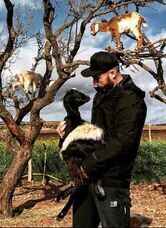
Darryl Grech (Malta)
Darryl graduated with a Diploma in Agriculture from the University of Malta. He obtained a Bachelor of Science Degree in Mediterranean Agro-Ecosystems Management from the same institution and collaborated with the University of Perugia in Italy. Darryl has been in the livestock industry for over ten years.
His primary research focuses on the characterization of the indigenous Maltese goat population. His other research interests include the conservation of the endangered indigenous livestock breeds of the Maltese islands, livestock production, animal behavior, and livestock handling.
Darryl works as a Principal Agricultural Officer at the Agriculture Centre and Innovation Hub for Malta’s Government. Here he manages herds of indigenous cattle, goats, sheep, and poultry. Part of his responsibility is to oversee the conservation of these indigenous livestock breeds.
Darryl is also a part-time lecturer at the MCAST Institute for Agribusiness, teaching livestock production and management expertise in small ruminants.
He is the founder and administrator of a voluntary organization named Breeds of Origin Conservancy. This organization was established in 2016, recognizing that conservation of the endemic flora and fauna, indigenous breeds; native species and subspecies; and cultivated varieties of trees and plants is vital to preserving the Maltese biodiversity for economic, social, educational, and cultural purposes. Today, these indigenous breeds, endemic species and subspecies, and cultivated varieties of trees and plants are increasingly threatened through commercial agriculture and consumption habits.
Darryl is also a national judge for sheep and goats during Malta’s annual agricultural show, called Imnarja.
Darryl graduated with a Diploma in Agriculture from the University of Malta. He obtained a Bachelor of Science Degree in Mediterranean Agro-Ecosystems Management from the same institution and collaborated with the University of Perugia in Italy. Darryl has been in the livestock industry for over ten years.
His primary research focuses on the characterization of the indigenous Maltese goat population. His other research interests include the conservation of the endangered indigenous livestock breeds of the Maltese islands, livestock production, animal behavior, and livestock handling.
Darryl works as a Principal Agricultural Officer at the Agriculture Centre and Innovation Hub for Malta’s Government. Here he manages herds of indigenous cattle, goats, sheep, and poultry. Part of his responsibility is to oversee the conservation of these indigenous livestock breeds.
Darryl is also a part-time lecturer at the MCAST Institute for Agribusiness, teaching livestock production and management expertise in small ruminants.
He is the founder and administrator of a voluntary organization named Breeds of Origin Conservancy. This organization was established in 2016, recognizing that conservation of the endemic flora and fauna, indigenous breeds; native species and subspecies; and cultivated varieties of trees and plants is vital to preserving the Maltese biodiversity for economic, social, educational, and cultural purposes. Today, these indigenous breeds, endemic species and subspecies, and cultivated varieties of trees and plants are increasingly threatened through commercial agriculture and consumption habits.
Darryl is also a national judge for sheep and goats during Malta’s annual agricultural show, called Imnarja.
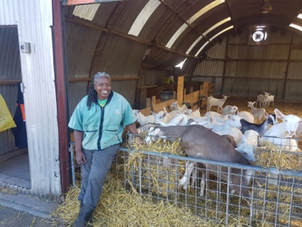
Dr. Vicki McLean (New Zealand)
Vicki graduated from the University of California Davis with a Doctorate of Veterinary Medicine and a Master’s Degree in Epidemiology and Population Medicine. She spent three years teaching at the University of Missouri Veterinary School before immigrating to New Zealand. She was a lecturer and a farm services clinician at the only veterinary teaching institution in New Zealand. She lectured at Massey University Veterinary School in NZ for four years and concurrently obtained a Ph.D. in dairy cattle mastitis with emphasis on Streptococcus uberis mastitis. Vicki went into private practice for nine years working in the Waikato Region of the North Island of NZ. In practice, she worked on species including small animals, but her main work was with dairy goats, dairy cattle, beef, sheep, and pig operations. She treated the individual animals, but always focused on the prevention of further clinical cases. In the last few years of private practice, half of the clients she had were commercial dairy goat farmers. After three years of doing contract health audits for all the Dairy Goat Cooperative Ltd (DGC) farms, they decided to employ Vicki full time.
Vicki has over 30 years of experience working with meat, fiber and dairy goats. At present, she is the only veterinary in NZ who is a Member of the Australian New Zealand College of Veterinary Science – Goat Medicine. Vicki oversees the health and welfare of approximately 60 thousand goats divided among 71 farms supplying the DGC. She ensures that healthy goats are producing top quality milk to produce formula for infants and children. She is a hands-on clinician as well as assisting and teaching other veterinarians about dairy goat and sheep medicine and management. She has talked at goat meat and fiber producers’ meetings. She is a member of several National Committees, including the National Mastitis Committee and an Animal Welfare Committee. Vicki has traveled extensively to international and regional goat conferences in the Netherlands, France, Australia, USA, England, and Cyprus. She has lost count to how many goat related conferences she has been to in the last ten years but will continue to travel and learn all she can to improve the animal health and welfare of the NZ goat industries.
Vicki’s present goal is to eradicate CAE from all commercially farmed goats in NZ.
Vicki graduated from the University of California Davis with a Doctorate of Veterinary Medicine and a Master’s Degree in Epidemiology and Population Medicine. She spent three years teaching at the University of Missouri Veterinary School before immigrating to New Zealand. She was a lecturer and a farm services clinician at the only veterinary teaching institution in New Zealand. She lectured at Massey University Veterinary School in NZ for four years and concurrently obtained a Ph.D. in dairy cattle mastitis with emphasis on Streptococcus uberis mastitis. Vicki went into private practice for nine years working in the Waikato Region of the North Island of NZ. In practice, she worked on species including small animals, but her main work was with dairy goats, dairy cattle, beef, sheep, and pig operations. She treated the individual animals, but always focused on the prevention of further clinical cases. In the last few years of private practice, half of the clients she had were commercial dairy goat farmers. After three years of doing contract health audits for all the Dairy Goat Cooperative Ltd (DGC) farms, they decided to employ Vicki full time.
Vicki has over 30 years of experience working with meat, fiber and dairy goats. At present, she is the only veterinary in NZ who is a Member of the Australian New Zealand College of Veterinary Science – Goat Medicine. Vicki oversees the health and welfare of approximately 60 thousand goats divided among 71 farms supplying the DGC. She ensures that healthy goats are producing top quality milk to produce formula for infants and children. She is a hands-on clinician as well as assisting and teaching other veterinarians about dairy goat and sheep medicine and management. She has talked at goat meat and fiber producers’ meetings. She is a member of several National Committees, including the National Mastitis Committee and an Animal Welfare Committee. Vicki has traveled extensively to international and regional goat conferences in the Netherlands, France, Australia, USA, England, and Cyprus. She has lost count to how many goat related conferences she has been to in the last ten years but will continue to travel and learn all she can to improve the animal health and welfare of the NZ goat industries.
Vicki’s present goal is to eradicate CAE from all commercially farmed goats in NZ.
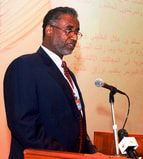
Dr. Osman Mahgoub Gaafar (Oman)
Osman is a professor of Animal and Veterinary Sciences at Sultan Qaboos University, Department of Animal and Veterinary Sciences, College of Agricultural and Marine Sciences. He holds a BSc in Veterinary Science and MSc in Meat Production from the University of Khartoum, Sudan and a Ph.D. from Lincoln College, University of Canterbury, New Zealand.
He is currently carrying out several duties including teaching, research, extension and community service. He has built strong relations with the local goat producers and goat scientist to improve the local goat population.
Osman has diverse experience in areas that cover goat and other domestic animal species including production systems, molecular genetics and breed evaluation, nutrition and health. He supervised several students who worked on goat production and health. He co-authored a book entitled “Goat Meat Production and Quality” published by CABI. He has published about 200 scientific, scholarly works including refereed scientific journal papers, conference presentations, and book chapters. He has also helped organize conferences on small ruminants in Oman.
Osman is a professor of Animal and Veterinary Sciences at Sultan Qaboos University, Department of Animal and Veterinary Sciences, College of Agricultural and Marine Sciences. He holds a BSc in Veterinary Science and MSc in Meat Production from the University of Khartoum, Sudan and a Ph.D. from Lincoln College, University of Canterbury, New Zealand.
He is currently carrying out several duties including teaching, research, extension and community service. He has built strong relations with the local goat producers and goat scientist to improve the local goat population.
Osman has diverse experience in areas that cover goat and other domestic animal species including production systems, molecular genetics and breed evaluation, nutrition and health. He supervised several students who worked on goat production and health. He co-authored a book entitled “Goat Meat Production and Quality” published by CABI. He has published about 200 scientific, scholarly works including refereed scientific journal papers, conference presentations, and book chapters. He has also helped organize conferences on small ruminants in Oman.
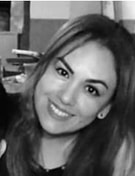
Cynthia Noemi Zárate Benítez (Paraguay)
Doctor in Veterinary Medicine from the National University of Asunción. She is currently in charge of the Department of Caprine Diseases in the National Service of Quality and Animal Health (SENACSA), Official Veterinary Service of Paraguay. In addition, she is a member of the Board of Directors of the Paraguayan Association of Caprine Breeders (APCC) where she is also the President of the Technical Commission. For seven consecutive years, she was leading the coordination of the goat production table in the Vice Ministry of Livestock of Paraguay within the framework of the Competitiveness Program.
Doctor in Veterinary Medicine from the National University of Asunción. She is currently in charge of the Department of Caprine Diseases in the National Service of Quality and Animal Health (SENACSA), Official Veterinary Service of Paraguay. In addition, she is a member of the Board of Directors of the Paraguayan Association of Caprine Breeders (APCC) where she is also the President of the Technical Commission. For seven consecutive years, she was leading the coordination of the goat production table in the Vice Ministry of Livestock of Paraguay within the framework of the Competitiveness Program.
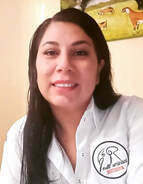
Doris Guadalupe "Lupe" Huamán Pasco (Peru)
My relationship with the goat world was born while studying at university. I did my pre-professional internships in the goat area of the farm of my faculty, and bovine health and reproduction.
When I began to work professionally, through projects of the Piura regional government, I was assigned to the cattle and goat farming sectors. These projects focused on rural communities, delivering technical training, and living among producers and carrying out work to provide them with tools that allowed them to improve productively.
Due to my master’s degree studies in Economics, specifically in Investment Projects, I was summoned year after year to formulate both projects, and technical livestock files focused on vulnerable population sectors with goats, sheep, and cattle breeding.
I develop diagnostic workshops and collect information on the agricultural situation of my region.
As part of being on the board of directors of the College of Engineers of Peru, I was elected for two periods as Chapter President of Animal Science Engineers of Piura. There I organized workshops, talks, and activities to promote goat breeding.
I formed a private investment project in 2014 (which is now my primary source of work). My work consisted of implementing a goat farm, “Viñas de Curumuy” with purebred goats, which we imported from Colombia. We brought in 28 Nubian and Alpine goats, becoming the first official importer to the country in 30 years.
On this farm, we are not only producing purebred animals to improve genetics nationwide, but we also contribute with the creation of awareness through guided visits for veterinary and animal science students from technological institutes and universities, as well as for goat production associations. We also receive students in the final cycle of their degree to carry out their pre-professional practices and to carry out small scientific trials using animals from the farm.
In 2018, together with my colleague Irma Celi, I established a small animal science service company known as “Small Ruminant Technologies SAC.” We provide different services, mainly on reproductive technology, and we also offer advisory services for project development, purchase of animals, and training.
Last year the Directorate of Agriculture of my region asked me to organize the 1st Regional Goat Fair, appointing me curator and chief judge of the phenotypic contest of Creole goats.
My relationship with the goat world was born while studying at university. I did my pre-professional internships in the goat area of the farm of my faculty, and bovine health and reproduction.
When I began to work professionally, through projects of the Piura regional government, I was assigned to the cattle and goat farming sectors. These projects focused on rural communities, delivering technical training, and living among producers and carrying out work to provide them with tools that allowed them to improve productively.
Due to my master’s degree studies in Economics, specifically in Investment Projects, I was summoned year after year to formulate both projects, and technical livestock files focused on vulnerable population sectors with goats, sheep, and cattle breeding.
I develop diagnostic workshops and collect information on the agricultural situation of my region.
As part of being on the board of directors of the College of Engineers of Peru, I was elected for two periods as Chapter President of Animal Science Engineers of Piura. There I organized workshops, talks, and activities to promote goat breeding.
I formed a private investment project in 2014 (which is now my primary source of work). My work consisted of implementing a goat farm, “Viñas de Curumuy” with purebred goats, which we imported from Colombia. We brought in 28 Nubian and Alpine goats, becoming the first official importer to the country in 30 years.
On this farm, we are not only producing purebred animals to improve genetics nationwide, but we also contribute with the creation of awareness through guided visits for veterinary and animal science students from technological institutes and universities, as well as for goat production associations. We also receive students in the final cycle of their degree to carry out their pre-professional practices and to carry out small scientific trials using animals from the farm.
In 2018, together with my colleague Irma Celi, I established a small animal science service company known as “Small Ruminant Technologies SAC.” We provide different services, mainly on reproductive technology, and we also offer advisory services for project development, purchase of animals, and training.
Last year the Directorate of Agriculture of my region asked me to organize the 1st Regional Goat Fair, appointing me curator and chief judge of the phenotypic contest of Creole goats.
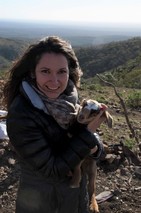
Marisia Geraci (South Africa)
Marisia has been the CEO for HPSA (Heifer Project South Africa) since 2009 and worked previously (2001 to 2009) for Heifer International.
She is currently leading a 5-year 100 million Rand (6 million euro) Goat Agribusiness Project with partner Mdukatshani, looking at increasing productivity, commercializing 7,000 rural women farmers and formalizing the indigenous goat market. In collaboration with Mdukatshani and the Department of Agriculture, she recently wrote a Goat Production Handbook, a Chicken Production Handbook and a Livestock Handbook. In addition, Marisia has developed training materials (getting AGRISETA accredited) for farmer and Community Animal Health Worker trainings, and a best practice guide for Community Animal Health Workers. She also developed a simple 5-ingredient goat protein block with partners that can be produced by youth in communities and established an Innovation Platform on goats bringing together stakeholders all along the goat value chain that meets quarterly.
Marisia has been the CEO for HPSA (Heifer Project South Africa) since 2009 and worked previously (2001 to 2009) for Heifer International.
She is currently leading a 5-year 100 million Rand (6 million euro) Goat Agribusiness Project with partner Mdukatshani, looking at increasing productivity, commercializing 7,000 rural women farmers and formalizing the indigenous goat market. In collaboration with Mdukatshani and the Department of Agriculture, she recently wrote a Goat Production Handbook, a Chicken Production Handbook and a Livestock Handbook. In addition, Marisia has developed training materials (getting AGRISETA accredited) for farmer and Community Animal Health Worker trainings, and a best practice guide for Community Animal Health Workers. She also developed a simple 5-ingredient goat protein block with partners that can be produced by youth in communities and established an Innovation Platform on goats bringing together stakeholders all along the goat value chain that meets quarterly.
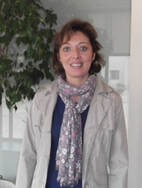
María Eva Muñoz Mejías (Spain)
Eva graduated in Veterinary Medicine from the University of Córdoba, Spain. She has been working with several local goat breeds of the south of Spain for more than ten years. Nowadays Eva is part-time professor of animal production at the University of Las Palmas de Gran Canaria, Spain, and she has founded a company specialized in the conservation of animal genetic resources and genetic improvement.
Eva graduated in Veterinary Medicine from the University of Córdoba, Spain. She has been working with several local goat breeds of the south of Spain for more than ten years. Nowadays Eva is part-time professor of animal production at the University of Las Palmas de Gran Canaria, Spain, and she has founded a company specialized in the conservation of animal genetic resources and genetic improvement.
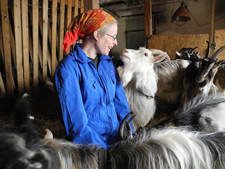
Dr. Ylva Persson (Sweden)
Ylva is an associate state veterinarian in ruminant diseases at the National Veterinary Institute (SVA) of Sweden, a governmental agency with expert authority on infectious diseases in animals. As part of her duties, Ylva is responsible for the goat activities at SVA, which include doing research, communicating with goat veterinarians and farmers, arranging workshops and training for goat associations, farmers, and veterinarians. Ylva’s focuses her research on udder health in dairy goats. Ylva graduated as a veterinarian in 1997 and obtained her Ph.D. in bull fertility the same year. SVA has employed Ylva since 2007.
Ylva is an associate state veterinarian in ruminant diseases at the National Veterinary Institute (SVA) of Sweden, a governmental agency with expert authority on infectious diseases in animals. As part of her duties, Ylva is responsible for the goat activities at SVA, which include doing research, communicating with goat veterinarians and farmers, arranging workshops and training for goat associations, farmers, and veterinarians. Ylva’s focuses her research on udder health in dairy goats. Ylva graduated as a veterinarian in 1997 and obtained her Ph.D. in bull fertility the same year. SVA has employed Ylva since 2007.
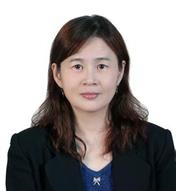
Dr. Hsiu-Luan Chang (Taiwan)
Hsiu-Luan is Professor of Animal Science at National Pingtung University of Science and Technology (NPUST). She holds a bachelor’s degree (BSc) in Animal Husbandry from the National Taiwan University, Taiwan. She also received her Master of Science (MSc) and Doctoral degrees (Ph.D.) from the University of Illinois at Urbana-Champaign, USA, in 1988.
After a brief stint at the same university, UI, as a post-doctoral researcher, she moved back to Taiwan and joined Taiwan Livestock Research Institute (TLRI) in 1989-2004 with research responsibilities. Her research focused on animal breeding and genetic evaluation of livestock to promote the genetic progress of pig, dairy cattle, goat and chicken industry in Taiwan. She also coordinated the national germplasm preservation program for farm animals from 1989 to 2004 before transferring to the NPUST.
In addition to serving as the Chairman of Animal Breeding and Genetics Division in TLRI for 15 years, Dr. Chang also held administrative positions at NPUST, including Chairman of Animal Science Department and Director of Innovation and Practical Training Center from 2010 to 2014.
She is currently on the advisory committees of National Animal Industry Foundation and Council of Agriculture, Executive Yuan counseling and evaluating animal sciences and industry programs funded by the government.
Hsiu-Luan is Professor of Animal Science at National Pingtung University of Science and Technology (NPUST). She holds a bachelor’s degree (BSc) in Animal Husbandry from the National Taiwan University, Taiwan. She also received her Master of Science (MSc) and Doctoral degrees (Ph.D.) from the University of Illinois at Urbana-Champaign, USA, in 1988.
After a brief stint at the same university, UI, as a post-doctoral researcher, she moved back to Taiwan and joined Taiwan Livestock Research Institute (TLRI) in 1989-2004 with research responsibilities. Her research focused on animal breeding and genetic evaluation of livestock to promote the genetic progress of pig, dairy cattle, goat and chicken industry in Taiwan. She also coordinated the national germplasm preservation program for farm animals from 1989 to 2004 before transferring to the NPUST.
In addition to serving as the Chairman of Animal Breeding and Genetics Division in TLRI for 15 years, Dr. Chang also held administrative positions at NPUST, including Chairman of Animal Science Department and Director of Innovation and Practical Training Center from 2010 to 2014.
She is currently on the advisory committees of National Animal Industry Foundation and Council of Agriculture, Executive Yuan counseling and evaluating animal sciences and industry programs funded by the government.
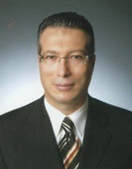
Dr. Irfan Daskiran (Turkey)
Irfan has over 25 years of experience and expertise in livestock production. He received his Master of Science and Ph.D. in animal husbandry and breeding & selection systems from Ankara University, Turkey.
He started his career as an Agricultural Engineer in Turkish Agricultural Bank for ten years and later transferred to the Yuzuncu Yil University, Faculty of Agriculture, Animal Sciences Department as an Assistant Professor in Van, Turkey. Irfan worked as a Lecturer and Researcher in University and managed the Vocational School of Bitlis for two years.
After seven years he transferred to the Ministry of Agriculture of Turkey, under the General Directorate of Agricultural Research and worked as a researcher in the National Small Ruminant Project for two years. He began working in the UN-FAO/SEC office as a JPO and prepared some international projects and organized several national and international meetings and workshops between 2009 and 2011. After his contract has ended, he transferred to Ministry of Food Agriculture & Livestock as a Small Ruminant Research Coordinator and managed National Small Ruminant Project for five years. During this period, he completed his Associate Professor academic criteria and produced more than a hundred academic articles on different livestock issues.
In 2016, he arranged the 12th International Conference on Goats in Turkey on behalf of the International Goat Association and participated as the chairperson of the conference. He is the IGA Country Representative for Turkey and has worked as a consultant for many national and international projects. He has been actively working in the ERA-Net project as the work package leader.
Highlights of his professional experience include:
Irfan has over 25 years of experience and expertise in livestock production. He received his Master of Science and Ph.D. in animal husbandry and breeding & selection systems from Ankara University, Turkey.
He started his career as an Agricultural Engineer in Turkish Agricultural Bank for ten years and later transferred to the Yuzuncu Yil University, Faculty of Agriculture, Animal Sciences Department as an Assistant Professor in Van, Turkey. Irfan worked as a Lecturer and Researcher in University and managed the Vocational School of Bitlis for two years.
After seven years he transferred to the Ministry of Agriculture of Turkey, under the General Directorate of Agricultural Research and worked as a researcher in the National Small Ruminant Project for two years. He began working in the UN-FAO/SEC office as a JPO and prepared some international projects and organized several national and international meetings and workshops between 2009 and 2011. After his contract has ended, he transferred to Ministry of Food Agriculture & Livestock as a Small Ruminant Research Coordinator and managed National Small Ruminant Project for five years. During this period, he completed his Associate Professor academic criteria and produced more than a hundred academic articles on different livestock issues.
In 2016, he arranged the 12th International Conference on Goats in Turkey on behalf of the International Goat Association and participated as the chairperson of the conference. He is the IGA Country Representative for Turkey and has worked as a consultant for many national and international projects. He has been actively working in the ERA-Net project as the work package leader.
Highlights of his professional experience include:
- Project coordination and management,
- Project preparation,
- Animal breeding and selection methods,
- Dairy goat farm management,
- Consultant services on livestock production,
- Data collection and analysis,
- FAO project experiences,
- Livestock strategy development, and
- Academic facilities, reporting, and writing facilities.
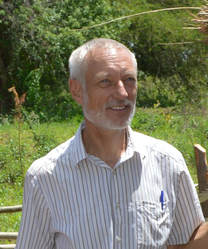
Dr. David Dowdy (Uganda)
David received his Ph.D. in Physical Organic Chemistry. He worked for British Gas from 1983 to 1993 as a research scientist.
David has spent the past 24 years living in Uganda. From 1993 to 2009, he headed JOY Youth Training Centre which was also a goat farm that supplied breeding stock throughout over Uganda, and to the Democratic Republic of Congo, Rwanda & Burundi.
Today he heads the JOY Goat Development Programme which works with farmers’ groups to set up cross-breeding projects to improve goat productivity. They also help plan and oversee breeding programs nationally. Joy Goat assesses the cultural and geographic contexts to plan the most appropriate intervention, for JOY Goat, and other organizations.
David received his Ph.D. in Physical Organic Chemistry. He worked for British Gas from 1983 to 1993 as a research scientist.
David has spent the past 24 years living in Uganda. From 1993 to 2009, he headed JOY Youth Training Centre which was also a goat farm that supplied breeding stock throughout over Uganda, and to the Democratic Republic of Congo, Rwanda & Burundi.
Today he heads the JOY Goat Development Programme which works with farmers’ groups to set up cross-breeding projects to improve goat productivity. They also help plan and oversee breeding programs nationally. Joy Goat assesses the cultural and geographic contexts to plan the most appropriate intervention, for JOY Goat, and other organizations.
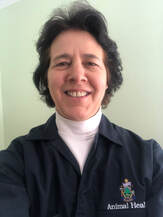
Carol Delaney (United States of America, Northeast)
Carol received a Master of Science in Ruminant Nutrition from Cornell University, New York, USA. She is currently the Livestock Specialist for the State of Maine Department of Agriculture, Conservation and Forestry, Animal Health Division. For twelve years prior to that, she was Coordinator of the Farmer and Partnership grant programs for the Northeast Sustainable Agriculture Research and Education (SARE), a NIFA/USDA on-farm research funding program. Carol has many years of experience owning and operating farm and food businesses, working on livestock farms, and raising dairy, meat, and draft goats. From 1998 to 2008, she was the Small Ruminant Dairy Specialist at the University of Vermont, USA, in the Department of Animal Science and the Center for Sustainable Agriculture. Before that, from 1989 to 2003, she was Faculty and Farm Manager at Sterling College, Craftsbury, Vermont, USA.
Carol has served as a Farmer-to-Farmer volunteer as a goat and sheep educator, funded by USAID and administered through Winrock International from September 1-14, 2012 in Finkolo Ganadougou, Mali and from April 1-19, 2013 in Tacuba, El Salvador.
Carol published A Guide to Starting a Commercial Goat Dairy in 2012 which is available for free download from the IGA website. Her other recent publications include:
The title of her presentation at the 2016 ICG in Antalya, Turkey, was Thinking Outside the Box - Innovative Solutions for Dairy Goat Management.
Carol still resides in the state of Maine, USA. You can visit her website at www.caroldelaneyconsulting.com or contact her at [email protected].
Carol received a Master of Science in Ruminant Nutrition from Cornell University, New York, USA. She is currently the Livestock Specialist for the State of Maine Department of Agriculture, Conservation and Forestry, Animal Health Division. For twelve years prior to that, she was Coordinator of the Farmer and Partnership grant programs for the Northeast Sustainable Agriculture Research and Education (SARE), a NIFA/USDA on-farm research funding program. Carol has many years of experience owning and operating farm and food businesses, working on livestock farms, and raising dairy, meat, and draft goats. From 1998 to 2008, she was the Small Ruminant Dairy Specialist at the University of Vermont, USA, in the Department of Animal Science and the Center for Sustainable Agriculture. Before that, from 1989 to 2003, she was Faculty and Farm Manager at Sterling College, Craftsbury, Vermont, USA.
Carol has served as a Farmer-to-Farmer volunteer as a goat and sheep educator, funded by USAID and administered through Winrock International from September 1-14, 2012 in Finkolo Ganadougou, Mali and from April 1-19, 2013 in Tacuba, El Salvador.
Carol published A Guide to Starting a Commercial Goat Dairy in 2012 which is available for free download from the IGA website. Her other recent publications include:
- Chapter: Dairy Goat Management co-written with Ann Starbard. Dairy Goat Production Handbook. Langston University. May 2016.
- Carol Delaney, contributing chapters on 1. American Dairy Goat Association and 2. History of the Goat, for The Oxford Companion to Cheese, Oxford University Press. November 2016.
- Husbandry of Dairy Animals: Goat: Replacement Management, co-author with Dr. Steve Hart, Goat Extension Specialist, Langston, University, Oklahoma, USA, Chapter in the Encyclopedia of Dairy Science, 2nd edition, Elsevier, Oxford, England, UK. (2011)
- “Implementing Dairy Goat Nutrition Programs on Farms for Improved Sustainability” SARE Research and Education grant, LNE04-200, $135,000. 2004-2008. https://projects.sare.org/project-reports/lne04-200/
The title of her presentation at the 2016 ICG in Antalya, Turkey, was Thinking Outside the Box - Innovative Solutions for Dairy Goat Management.
Carol still resides in the state of Maine, USA. You can visit her website at www.caroldelaneyconsulting.com or contact her at [email protected].
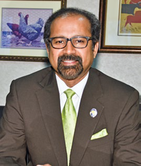
Dr. Govind Kannan (USA, Southeast)
Govind, Professor of Animal Science at Fort Valley State University (FVSU), received his professional degree in Veterinary Medicine in 1986 from Madras Veterinary College, India. He also received his MVSc degree from the same institution in 1988. After serving as a faculty member at Madras Veterinary College for four years, he moved to the US in 1993 and earned his Ph.D. at the University of Maryland, College Park in 1996. After a brief stint at the University of California at Davis as a post-doctoral researcher, he joined Fort Valley State University in 1997 with research and teaching responsibilities. His research focuses on pre-harvest management methods to minimize animal stress and improve meat quality and food safety in small ruminants and post-harvest methodologies to improve quality and safety of goat meat.
Dr. Kannan has held several administrative positions at FVSU, including Coordinator of Animal Science undergraduate and graduate programs, Director of the Georgia Small Ruminant Research and Extension Center, Assistant Dean for Research, and Interim Provost and Vice President for Academic Affairs. Currently, he is a tenured full Professor and Dean of the College of Agriculture, Family Science, and Technology and has provided outstanding leadership to the College.
Dr. Kannan has been an advocate of applied research and outreach programs that empower small and underrepresented farmers with the knowledge and technical skills needed to sustain successful agricultural enterprises. He was recognized at the White House in 2012 as a “Champion of Change” for his efforts in strengthening global food security. He was recently reappointed by the US Secretary of Agriculture to serve on the National Agricultural Research, Extension, Education, and Economics (NAREEE) Advisory Board representing the National Food Animal Sciences Society constituency. He also recently completed his term as Chair of the Association of 1890 Research Directors, one of the regional associations of APLU’s Board on Agricultural Assembly.
Govind, Professor of Animal Science at Fort Valley State University (FVSU), received his professional degree in Veterinary Medicine in 1986 from Madras Veterinary College, India. He also received his MVSc degree from the same institution in 1988. After serving as a faculty member at Madras Veterinary College for four years, he moved to the US in 1993 and earned his Ph.D. at the University of Maryland, College Park in 1996. After a brief stint at the University of California at Davis as a post-doctoral researcher, he joined Fort Valley State University in 1997 with research and teaching responsibilities. His research focuses on pre-harvest management methods to minimize animal stress and improve meat quality and food safety in small ruminants and post-harvest methodologies to improve quality and safety of goat meat.
Dr. Kannan has held several administrative positions at FVSU, including Coordinator of Animal Science undergraduate and graduate programs, Director of the Georgia Small Ruminant Research and Extension Center, Assistant Dean for Research, and Interim Provost and Vice President for Academic Affairs. Currently, he is a tenured full Professor and Dean of the College of Agriculture, Family Science, and Technology and has provided outstanding leadership to the College.
Dr. Kannan has been an advocate of applied research and outreach programs that empower small and underrepresented farmers with the knowledge and technical skills needed to sustain successful agricultural enterprises. He was recognized at the White House in 2012 as a “Champion of Change” for his efforts in strengthening global food security. He was recently reappointed by the US Secretary of Agriculture to serve on the National Agricultural Research, Extension, Education, and Economics (NAREEE) Advisory Board representing the National Food Animal Sciences Society constituency. He also recently completed his term as Chair of the Association of 1890 Research Directors, one of the regional associations of APLU’s Board on Agricultural Assembly.
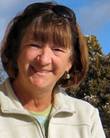
Lisa Shepherd (USA, Southwest)
Lisa currently works for the American Dairy Goat Association as the Performance Programs Manager. This involves efforts with the DHI Production Testing, Linear Appraisal, Sire Development, DNA Typing, Artificial Insemination, and Type programs. Prior to this, she was employed in the laboratory genetics field for 30 years which evolved into the areas of quality assurance and regulatory affairs. Lisa is a representative to the California Dairy Goat Advisory committee and on the Board of New Mexico’s caprine DHIA.
Lisa currently works for the American Dairy Goat Association as the Performance Programs Manager. This involves efforts with the DHI Production Testing, Linear Appraisal, Sire Development, DNA Typing, Artificial Insemination, and Type programs. Prior to this, she was employed in the laboratory genetics field for 30 years which evolved into the areas of quality assurance and regulatory affairs. Lisa is a representative to the California Dairy Goat Advisory committee and on the Board of New Mexico’s caprine DHIA.
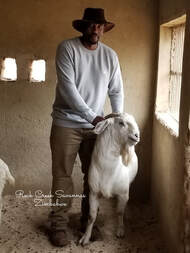
Jonathan Chirisa (Zimbabwe)
Jonathan (Jon) Chirisa is a passionate Savanna goat breeder in Zimbabwe. Jon is CEO of Tradegrid Systems Inc., a trade and investment consulting company, and a seasoned tradesman in three disciplines who has experience in construction of agricultural, industrial mining and manufacturing plants across the globe. This extensive experience with numerous world-class companies has given him an insight into the world of industry.
Zimbabwe is known for its quality beef, one of the best in the world. The favorable climatic conditions and quality foliage encouraged Jon to work closely with prominent Zimbabwean businessman and developer, John Mapondera.
Hard work gave birth to the Zimbabwe Goat Improvement Centre and the proposed Zambezi Valley Goat Project, a massive goat breeding project (for export and local markets) that has an outgrower program which will boost the economy and improve the local genetic pool. As a proud citizen and an international goat enthusiast, Jon contacted the International Goat Association to become a member and with the hope of working hand-in-hand in this project and the national outgrower program.
His enthusiasm, mindset and desire to see small ruminant development in Zimbabwe and across the region will be of great value to the global goat community of which IGA stands as a leader.
Jonathan (Jon) Chirisa is a passionate Savanna goat breeder in Zimbabwe. Jon is CEO of Tradegrid Systems Inc., a trade and investment consulting company, and a seasoned tradesman in three disciplines who has experience in construction of agricultural, industrial mining and manufacturing plants across the globe. This extensive experience with numerous world-class companies has given him an insight into the world of industry.
Zimbabwe is known for its quality beef, one of the best in the world. The favorable climatic conditions and quality foliage encouraged Jon to work closely with prominent Zimbabwean businessman and developer, John Mapondera.
Hard work gave birth to the Zimbabwe Goat Improvement Centre and the proposed Zambezi Valley Goat Project, a massive goat breeding project (for export and local markets) that has an outgrower program which will boost the economy and improve the local genetic pool. As a proud citizen and an international goat enthusiast, Jon contacted the International Goat Association to become a member and with the hope of working hand-in-hand in this project and the national outgrower program.
His enthusiasm, mindset and desire to see small ruminant development in Zimbabwe and across the region will be of great value to the global goat community of which IGA stands as a leader.
